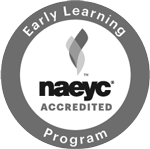Based on the Constructivist Theory of Learning, our program focuses on five program goals considered essential for developing the whole child. Expand the sections below to learn more about each goal, the characteristics displayed in the child, and how we encourage their growth.
Autonomy
A child who possesses autonomy demonstrates the following characteristics:
- Self-directs
- Stays constructively busy
- Cooperates with other children and adults
- Completes tasks
- Shows confidence in own ability
- Is appropriately assertive
How we encourage autonomy:
- Children construct their own knowledge through play using learning centers, outside play, group music and story.
- We show them how to be independent through situations such as cleaning up their own plate after lunch.
- They are encouraged to use their words and develop self-help skills.
- Our teachers model the way in which the children should speak with friends and teachers.
Integrity
A child who develops integrity exhibits the following characteristics:
- Cooperates with other children and adults
- Shows courtesy behaviors
- Helps establish rules of the group life
- Imposes rules on self-behavior
- Shares materials
- Displays respect for others and own possessions
How we encourage integrity:
- Model being polite.
- Encourage children to share.
- Help children understand rules and why we have them.
- Show children respect.
Openness
A child who acquires openness displays the following characteristics:
- Expresses feelings and ideas
- Engages in conversations
- Responds to open-ended questions
- Expresses empathy toward others
- Listens to others
- Tries the unfamiliar and is curious
- Gives and asks for help
How we encourage openness:
- Ask children to tell us how they feel
- Model being open with our feelings
- Encourage children to try new things
- Encourage children to interact with others, share feelings and ideas
Problem Solving
A child who shows problem solving can do the following:
- Communicates ideas and feelings with ease
- Persists in completing tasks
- Retries a task previously unable to do
- Solves problems in a positive manner
- Is willing to try unfamiliar tasks
How we encourage problem solving:
- Showing children different ways to solve problems.
- Encourage children to not give up.
- Model how to solve a problem with a friend.
Emerging Academics
A child who possesses emerging academics will exhibit the following:
- Prereading strategies
- Prewriting skills
- Mathematical skills
- Shape, name and color identification
- Classifying
- Patterning
- Seriation
- Appropriate ways to handle a book
How we encourage emerging academics:
- Individual, small, large and group experiences
- Assessing children on a continual basis
- Indoor and outdoor learning centers
- Repetition of phonetic and phonological awareness
- Opportunities to interact with reading, math and writing boxes
- Morning meetings
- Sharing and speaking in front of others
 Axe ’Em, Jacks!
Axe ’Em, Jacks!

